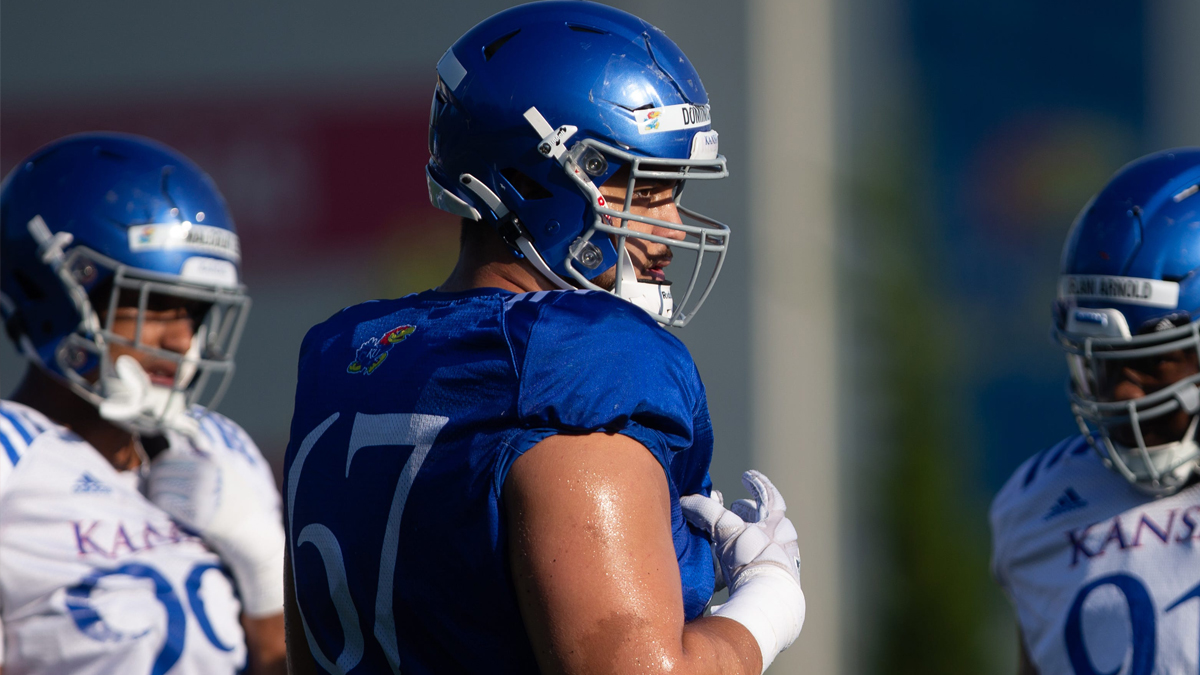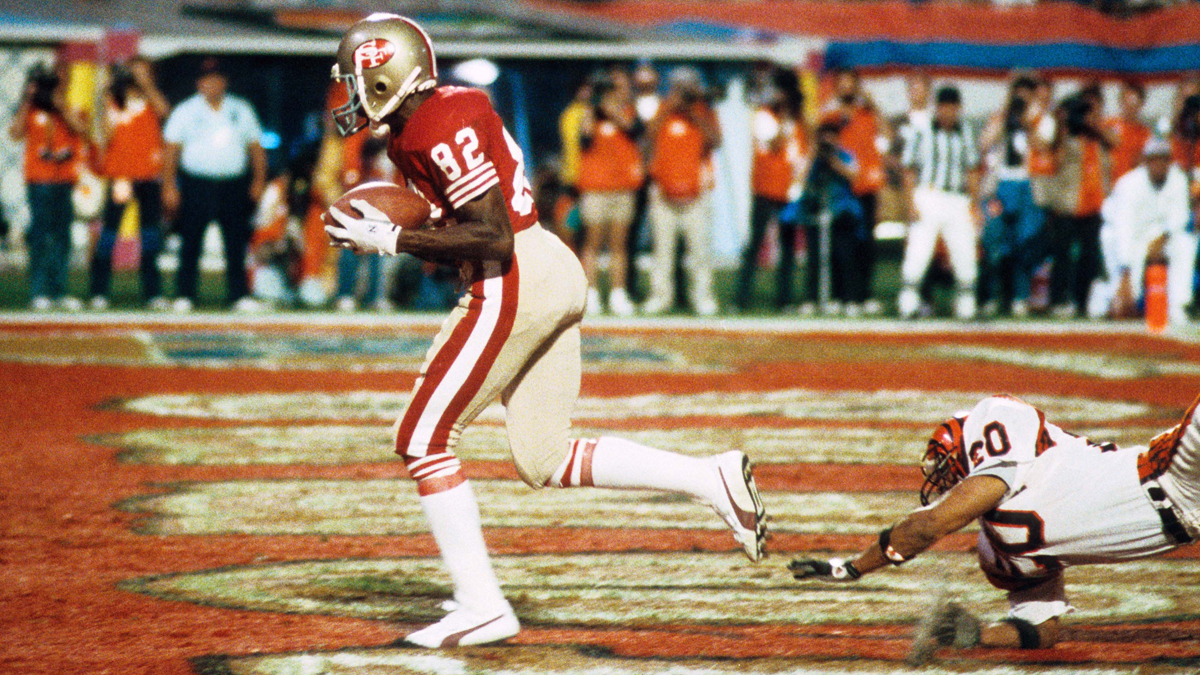- Programming Note: Catch an excerpt of Steve Young's interview Sunday during "49ers Postgame Live" on NBC Sports Bay Area.
Steve Young is a Pro Football Hall of Famer and 49ers legend. But his journey to the top was filled with many lows.
Lows that, for so long, were kept hidden as the QB quietly dealt with separation anxiety as a child that carried over into his football career.
Stay in the game with the latest updates on your beloved Bay Area and California sports teams! Sign up here for our All Access Daily newsletter.
His life story has been highlighted perfectly by a uniquely similar scenario.
“I always say if you were lost in the woods, like lost lost in the woods and you had no idea where you were going and a park ranger popped by, would you ask him for directions?” Young shared in a recent episode of “Headstrong: Men’s Health and Sports.”
Young was born in Salt Lake City, Utah, and attended high school in Greenwich, Connecticut. But at an early age, he noticed something was off.
It started in second grade when his parents went out of town for the weekend. Young and his siblings stayed at a relative's house and it seemed like everyone except him was excited about that.
San Francisco 49ers
Young said his siblings were ecstatic to be in a new place playing with their cousins and essentially doing what they wanted without their parents. But for Young, it was a different story.
Young described the moment as “foreign” and “like a horror movie,” adding he felt like he was going to die.
“We found out later, many years later, separation anxiety as kids was a genetic thing,” Young said.
Throughout his childhood, Young did not want to leave home. But as a three-sport star in high school and straight-A student, no one ever had a clue.
And then he had to go to college.
“I didn’t want to go to college, but I wanted to play football,” Young said. “But my genetics were like, ‘No, you can’t.’ And it was hard.
"Childhood separation anxiety isn’t common but a lot of kids have it at different levels. I had a pretty severe case but when it’s undiagnosed, you kind of carry through that stuff.”
And that’s exactly what he did.
Young opted to play collegiate football at BYU, about 45 miles away from where he was born. Continuing to play football at the next level helped Young with his anxiety, in a way.
He noted some of the good things that come with playing football are that it makes you hyperaware, hyperfocused and more cognizant of your surroundings.
But then there’s the ugly part of it.
Young said his pregame anxiety and unusual routine became a norm. He would vomit before a game and then ball out as if nothing ever happened. It almost became a ritual for those around him.
“The funny thing is the anxiety I would feel before the game, the throwing up, became a thing with my college roommates like, ‘Is he throwing up yet? He’s got to throw up and then he plays great,’ and that’s how it went,” Young said.
“And it was miserable, but it was miserable in a college way. I was just miserable from like Thursday on. Then I get all wound up and throw up and then play great.”
He somehow got through college like that and before even thinking about taking his talents to the NFL, he took a brief pause to listen to his thoughts, wondering if enough was enough. Could he continue to play -- to live -- like this?
Young contemplated over and over again on his way to a pre-draft workout with the Cincinnati Bengals. But after getting out of the car and seeing the field, he made up his mind.
“Oh no, we’re going,” he told himself.
So he continued on like he had his entire life. After briefly playing for the Los Angeles Express in the USFL, Young signed with the Tampa Bay Buccaneers in 1985.
He played just 19 games for the Bucs before he was traded to the 49ers in 1987 as a backup for Joe Montana.
In 1991, with Montana injured, Young took over as the starting QB.
It was around the time the Gulf War broke out in the Middle East. Young got off to a rough start and remembers the headline on the front page of the San Francisco Chronicle: “The Gulf War: It’s Steve Young’s fault.”
Young understood it was mostly a joke. Montana was out. Young was in. The 49ers were not playing well. Everything was his fault.
“It was a thing,” Young said. “I had realized in the middle of that, the way I took that in was like, ‘Yeah, it is my fault and I’ve got to do more,’ and then we lose another game and I got into a hole.”
Young said he went days without sleeping and people started to notice. They knew he had a peculiar way of getting ready for games but knew something wasn’t right.
The morning of a game, Young was “a mess” and there was no way he was going to play.
“Way,” Young responded, “We’re going to play.”
Young promised to talk to the team doctor if they won the game. He ended up playing really well in a San Francisco win.
So as promised, he went to James “Jim” Klint, the 49ers' team doctor for over two decades, and for the first time opened up about, well, everything.
“All of a sudden I saw a tear, a big ball tear come out of his eye and drop, and then another,” Young said. “And then he went on to tell me that he had all this terrible anxiety getting through medical school and has fought it kind of his whole life.
“And he was so upset, he was weeping because [he said], ‘I watched you and I sensed, as someone who has dealt with that and watching you, I sensed that there was something there and my instinct as a doctor and I feel terrible.’ ”
It’s a powerful message that goes to show the significance one conversation can have. It ended up being one that changed Young's life.
Young was lost in those woods for so long and then a park ranger, Klint, helped him find direction in his life once again.
"Playing football, playing great football and playing All-Pro football was not easy. So it’s not like, ‘Oh, it was a walk in the park from then on,’ but now I had some tools," Young said. "And it got better. I always say mental health is for everybody. I guarantee everyone listening to this, if they were honest with themselves, would say, 'Yeah, I got a couple of questions myself but I don’t want to ask them because I don’t ask for help, I got nothing wrong.'
"It’s not about whether you have something wrong or not, it’s a question. We all have mental health questions. Everyone. Every human. Ask them."
RELATED: How Mullin gained perspective after overcoming alcohol abuse
After 15 seasons in the NFL, Young retired after the 1999 season.
He is a Hall of Famer, a three-time Super Bowl champion, a Super Bowl MVP, and forever a 49ers icon. Now he's enjoying his new role: Park ranger.
"To me, it’s not like lay on a couch and have some guy writing this stuff. No, this is just a conversation about tools and how to manage the conflicts and challenges in your life," Young said. "How shameful can that be? That’s why I’m willing to talk about it. Because now I’m the park ranger.
"I love that role, paying it forward."


